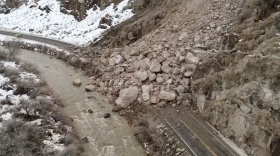This is a story you’ve heard a lot on this program. But only because it seems to be getting worse.
More people are dying in traffic crashes.
The latest state fatality report shows that in the first seven months of this year, 142 people have died on Clark County roads. That’s a 20% increase from 2021.
Clark County isn’t alone. Traffic fatalities in the United States last year reached a 16-year high: 43,000 people died. Pedestrian deaths that year reached a 40-year high: 7,500 people died.
Las Vegas Metropolitan Police just announced yesterday that pedestrian deaths this year are more than 30% higher than this time last year.
Experts attribute the rise in traffic deaths to risky behavior like speeding, distracted driving, drinking and driving, and not wearing seatbelts.
And it’s not the same in every country. Germany and the Netherlands average four traffic deaths per 100,000 people. In the U.S., it’s 12 people --three times as many.
So what’s the difference? And how do we lower the number of people dying on our roads?
A panel of traffic experts spoke with State of Nevada host Joe Schoenmann about what's going on in the valley.
Andrew Bennett, the director of Clark County’s Office of Traffic Safety, said their primary focus is process and policy, and working with 39 other county departments on how they can improve roadways.
Issues like street racing have been and continue to be addressed, and speed is what they’re working on now to combat.
“There needs to be a sense of urgency,” he said, and the creation of the department allows them to act with urgency –avoiding much of the bureaucratic red tape. “We combine education, enforcement and engineering to have that presence. And to make sure that anybody who lives here or visits here understands that we have that ability to keep our roadway safe. And so one of our primary focuses was aggressive and reckless driving.”
Aggressive and reckless driving became much more prevalent during the pandemic.
The programs that have come out of Bennett’s department to combat that are being presented in other states.
“Nevada was at the forefront in some of the programs that we're developing to reduce recidivism to reduce street racing and to reduce, ultimately reduce, fatalities,” he said.
Those programs include engineering efforts to ensure safety for all road users, and enforcement efforts to prevent drivers from receiving multiple DUIs. However, speed and impairment remain the top two causes of fatal crashes. Most of the drivers involved in those crashes are men between the ages of 18 and 35.
“The common factor between all fatalities is a human life,” Bennett said. “Traffic fatalities are the great equalizer and it can happen to anybody at any time.”
He noted years ago in the Las Vegas Valley, it took about 15 minutes to get from point A to point B, but now commutes can last 45 minutes to an hour or more due to heavy traffic. He said drivers need to allow more time for their drive, and have more compassion on the road.
"In August already this year, we've had five pedestrian fatalities.” said Erin Breen, the coordinator for UNLV Transportation Research Center’s Traffic safety Coalition. “Wow, and another one on private property that I'm not sure would be an official number for us. And Metro’s fatal team has been called out another four times, so those are for more potential fatalities for pedestrians far and away. It's, once again, pedestrians lead the way, followed closely by motorcyclists this year, who are also having a terrible year.”
She said people “draw a circle around” their face when they get in their cars, and “forget there’s a world out there,” leading to traffic deaths.
Along the same lines, Las Vegas Metropolitan Police traffic intervention officer Mike Thiele said pedestrians are about equally at fault as drivers – either the pedestrian isn’t paying attention or the driver isn’t.
“We also have, where jaywalking is not criminal right now. It's not illegal for them to jaywalk anymore. So that's now increased, on top of the enforcement and what we are allowed to do as an agency and for law, we are not allowed to enforce the jaywalking for them crossing outside of that crosswalk,” Thiele said.
If a driver is ticketed, there’s a likely chance it’ll be reduced to a parking violation by the courts. Would harsher punishment, or following through on the intended punishment, make a difference on the roads? About 200,000 traffic tickets were reduced in Southern Nevada from 2017 to 2021, according to the Las Vegas Review-Journal.
“We're out here enforcing, we want the other arm to come out here and make sure that the punishment is sought through,” Thiele said.
Bennett said they’ve worked to align the conversations when it comes to punishment.
“We plan on moving toward a system that holds people accountable under the law with their driving record,” he said.
Clark County Commissioner Michael Naft said everyone involved in crashes could be doing more. He also said agencies like Metro are in a shortage, covered earlier this week on KNPR, which leads to less traffic patrol on the valley’s roads.
“Everyone is a user of our system, whether you're driving the car, whether you're working the trauma center, whether you're working the coroner's office, whether you're in public works, putting up the infrastructure, the engineers who are designing our roads, the construction workers who are building our roads, we can all be doing more,” he said. “But I think that goes to the force, to the police departments, as well. Every single officer ought to understand that. When the numbers of traffic related fatalities are higher than victims of violent crime in our community, we need to put a strong emphasis on the way our officers are trained.”
Michael Naft, commissioner, Clark County Commissioner, Erin Breen, coordinator, UNLV Transportation Research Center’s Traffic Safety Coalition; Andrew Bennett, director, Clark Country Office of Traffic Safety; Mike Thiele, traffic intervention officer, Las Vegas Metropolitan Police Department











